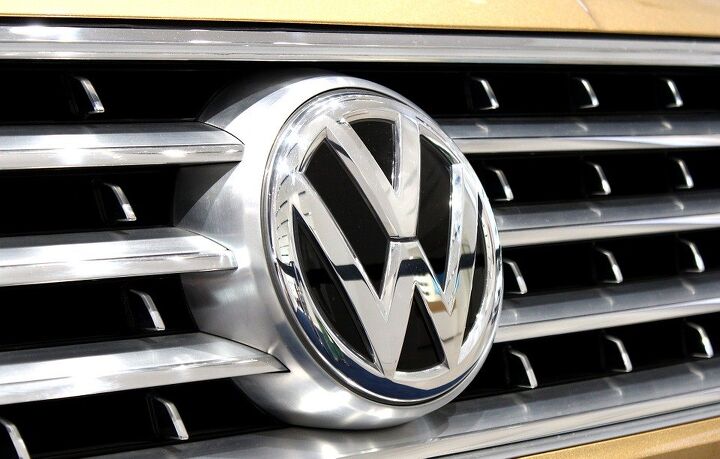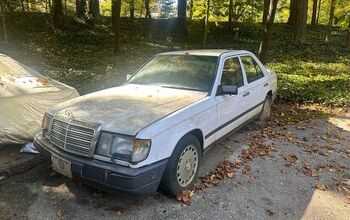Ein Problem: Volkswagen Facing $10.7 Billion Investor Lawsuit Over Diesel Scandal

Volkswagen Group will be staring down the barrel of a courtroom next week, which isn’t anything new. The automaker’s investors want 9.2 billion euros ($10.7 billion) in compensation after arguing the carmaker should have informed shareholders about a diesel emission scandal before regulators got the word out in 2015.
The lawsuit groups 1,668 individual claims, primarily those brought in by VW’s institutional shareholders, who previously accused the automaker of failing to inform investors about the scope of a scandal. Volkswagen’s excuse has always been that top brass had no idea the issue would be serious enough to cost the company 27.4 billion euros in punitive fines. But new evidence continues to emerge that upper management was well aware of the defeat devices’ existence.
Shareholders claim that, if Volkswagen opened up early on the problem, they could have limited the losses stemming from the scandal. Instead, the Environmental Protection Agency blew the whistle in September of 2015 and VW shares plummeted as details emerged. Reuters estimates that shares dropped 37 percent in value within the first few days following the EPA’s announcement. That valuation would continue to fall sharply for the remainder of the month.
Volkswagen has since admitted to emissions cheating and accepted its penance, but continues to deny any wrongdoing as far as the regulatory disclosure is concerned. The company has remained steadfast in its assertion that board members, including Volkswagen’s current chief executive Herbert Diess and chairman Hans Dieter Poetsch, have not violated any official disclosure rules.
“Neither the management board nor individual board members caused or were involved with the compliance violation in the United States,” VW’s court filing said.
The trial is scheduled to begin on Monday in Braunschweig, Germany — near VW’s Wolfsburg headquarters. Presiding Judge Christian Jaede will be running the show.
Because Germany doesn’t allow U.S.-style class-action lawsuits, the case, brought by Deka Investment GmbH, will serve as a proof for future litigation. The Wall Street Journal reports that the outcome would serve to inform the rulings on the multitude of pending lawsuits seeking $10.7 billion in damages. It also claimed that a victory for shareholders was far from certain, as it is not common practice for German courts to grand such large awards for damages in civil litigation cases.
[Image: Volkswagen]

A staunch consumer advocate tracking industry trends and regulation. Before joining TTAC, Matt spent a decade working for marketing and research firms based in NYC. Clients included several of the world’s largest automakers, global tire brands, and aftermarket part suppliers. Dissatisfied with the corporate world and resentful of having to wear suits everyday, he pivoted to writing about cars. Since then, that man has become an ardent supporter of the right-to-repair movement, been interviewed on the auto industry by national radio broadcasts, driven more rental cars than anyone ever should, participated in amateur rallying events, and received the requisite minimum training as sanctioned by the SCCA. Handy with a wrench, Matt grew up surrounded by Detroit auto workers and managed to get a pizza delivery job before he was legally eligible. He later found himself driving box trucks through Manhattan, guaranteeing future sympathy for actual truckers. He continues to conduct research pertaining to the automotive sector as an independent contractor and has since moved back to his native Michigan, closer to where the cars are born. A contrarian, Matt claims to prefer understeer — stating that front and all-wheel drive vehicles cater best to his driving style.
More by Matt Posky
Latest Car Reviews
Read moreLatest Product Reviews
Read moreRecent Comments
- MaintenanceCosts Nobody here seems to acknowledge that there are multiple use cases for cars.Some people spend all their time driving all over the country and need every mile and minute of time savings. ICE cars are better for them right now.Some people only drive locally and fly when they travel. For them, there's probably a range number that works, and they don't really need more. For the uses for which we use our EV, that would be around 150 miles. The other thing about a low range requirement is it can make 120V charging viable. If you don't drive more than an average of about 40 miles/day, you can probably get enough electrons through a wall outlet. We spent over two years charging our Bolt only through 120V, while our house was getting rebuilt, and never had an issue.Those are extremes. There are all sorts of use cases in between, which probably represent the majority of drivers. For some users, what's needed is more range. But I think for most users, what's needed is better charging. Retrofit apartment garages like Tim's with 240V outlets at every spot. Install more L3 chargers in supermarket parking lots and alongside gas stations. Make chargers that work like Tesla Superchargers as ubiquitous as gas stations, and EV charging will not be an issue for most users.
- MaintenanceCosts I don't have an opinion on whether any one plant unionizing is the right answer, but the employees sure need to have the right to organize. Unions or the credible threat of unionization are the only thing, history has proven, that can keep employers honest. Without it, we've seen over and over, the employers have complete power over the workers and feel free to exploit the workers however they see fit. (And don't tell me "oh, the workers can just leave" - in an oligopolistic industry, working conditions quickly converge, and there's not another employer right around the corner.)
- Kjhkjlhkjhkljh kljhjkhjklhkjh [h3]Wake me up when it is a 1989 635Csi with a M88/3[/h3]
- BrandX "I can charge using the 240V outlets, sure, but it’s slow."No it's not. That's what all home chargers use - 240V.
- Jalop1991 does the odometer represent itself in an analog fashion? Will the numbers roll slowly and stop wherever, or do they just blink to the next number like any old boring modern car?































Comments
Join the conversation
Shareholder lawsuits are weird. The suit is on behalf of shareholders, who bear the profits and losses of VAG. Lets pretend they win their $10b. Where does it come from? From VAG shareholder equity. A forced dividend, paid out by current shareholders to the 2015 shareholders? Wonder if German lawyers will take the top 30% of the settlement?
as a german i know a bit more, so here it is: one memo-styled letter appeared, written by some mid-level manager of VW at then CEO Winterkorn, informing him of the potentiality of a possible lawsuit in the US months before the CEO took any `action`- if you want to call it that. This mid-level manager stands by his word and the rest is to be decided..